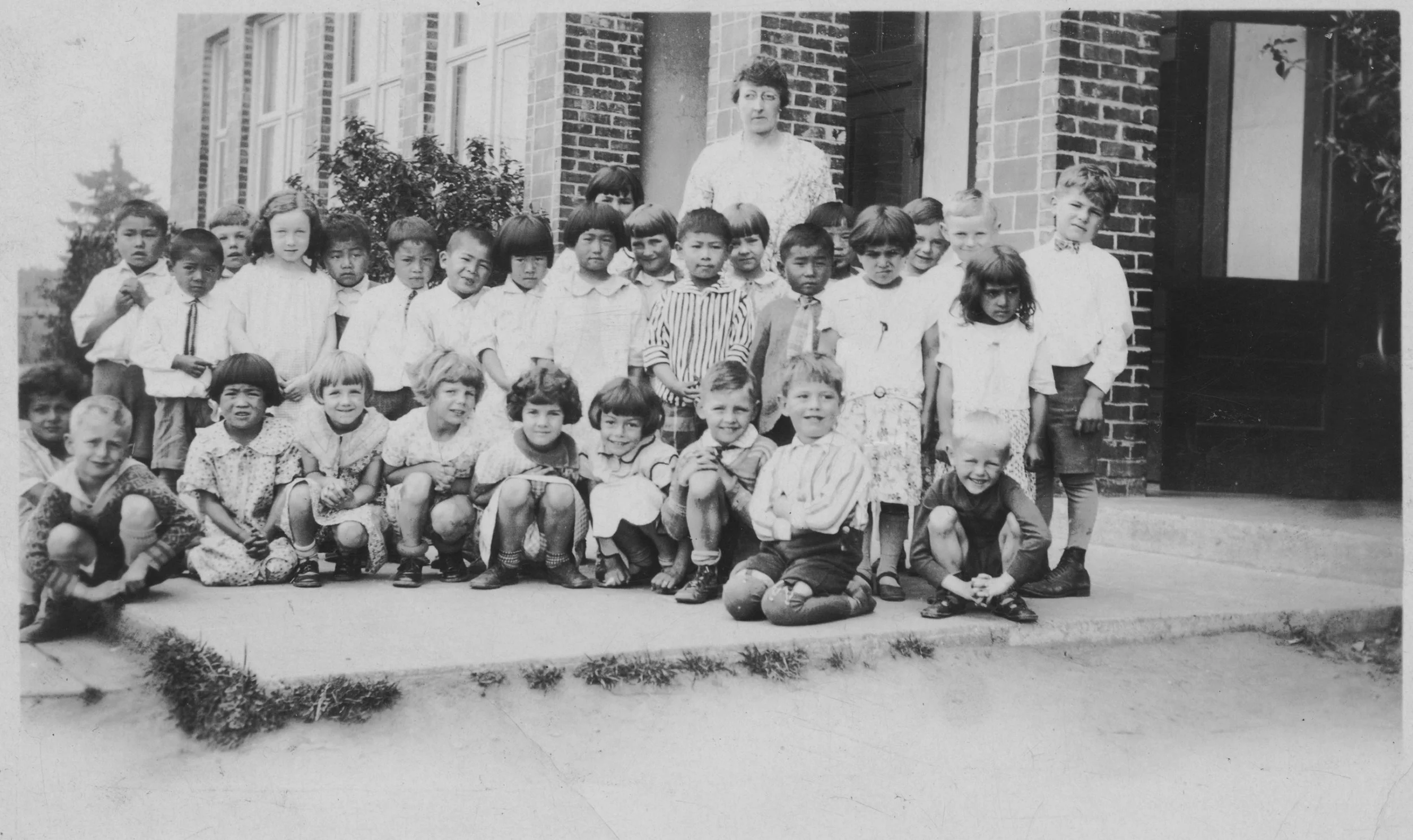BY Barb williams, EASTSIDE HERITAGE CENTER VOLUNTEER
For thousands of years Native Americans gathered the rich harvest of plants and animals along the shores of the Mercer Slough. In 1916 when the Ballard Locks were constructed in Seattle, the water level on the Eastside dropped 9-12 feet exposing dry lands such at those along the Mercer Slough. Farmers moved into the area.
Andrew (3rd from left) and Marc (far left) Balatico with workers in fields, c. 1930
EHC Research Collection, courtesy Balatico family
One of the farmers was Andrew Balatico and his brother, Marceliano. By 1977 they were the only truck farmers in Bellevue. Customers came from far and near to buy their vegetables. The Balatico’s pumpkin patch was well-known to local residents. As orphans in 1926, the brothers immigrated to the United States from the Philippine Islands. They worked on the railroads then moved to Bellevue in 1930 to work for Japanese farmers. After leasing Newport Hills farmland and hiring Japanese workers, the brothers purchased 23 acres near the Mercer Slough. They dynamited the plow-breaking stumps in the peat marsh and added lime to sweeten the acidic soil before anything would grow. Their farm became successful. However, during World War II they feared they would be drafted. But due to a decree issued by President Roosevelt, they were able to continue farming. In 1985, Andrew sold his property to the City of Bellevue. Much of the old farm is presently covered by the Light Rail parking garage on Bellevue Way SE and is part of the Mercer Slough Nature Park. He passed away in 2002 at the age of 92.
OR/L 79.79.358 - Cecelia Winters, 1917 with produce.
Other people who came to farm were Cecilia and Frederick Winters. In 1917 they bought ten acres of land just north of the Balatico farm. They built one of the most successful wholesale floral businesses of the time specializing in greenhouse-raised azaleas, daffodils and iris. Fortunately for the Winters, they had purchased carloads of imported Dutch and Spanish bulbs before a ban on imported bulbs was enforced in 1926 due to the spread of an infectious bulb disease. Their bulb business became highly profitable and they were able to build their lovely home “The Winters House”; the only building in Bellevue on the National Register of Historic Places. Their home exists today along Bellevue Way SE. The Spanish Eclectic style building was built for $32,000 in 1929 by contractor, Anson Ralph Grosvenor. During this time, Cecelia grew vegetables that she and her sons, Walter and Forrest, sold to summer residents in Beaux Arts. In 1937 the Winters sold part of their estate to Andre Ostbo who raised prize-winning rhododendrons in and around the greenhouses that are partially visible today along the Ostbo Loop boardwalk east of the house. He operated his King of Shrubs business there until the 1970s. In 1943, the house and grounds were sold to Frank and Anna Riepl. The Winters eventually moved to Vashon Island where they established a business specializing in carnations. By 1988 the property had been purchased by the City of Bellevue and included in the Mercer Slough Nature Park.
Bill Pace at Overlake Blueberry Farm. Seattle Times, 2003.
The boggy, acidic soils of the Mercer Slough may not have been ideal for the Balatico and Winters farms, but it was perfect for growing blueberries which have been in the area since 1933. About this time Lee Denison settled on land located between the Balatico and Winters farms. This became the Overlake Blueberry Farm. Denison’s daughter, Mrs. E.L. Van Tine helped develop the business and cultivate the fields. Since then there have been changes. Nancy Harding operated the farm for 14 years until her lease ran out and the City of Bellevue wanted to keep the blueberries while preserving the natural environment and opening the Mercer Slough Nature Park to the public. Bill Pace, Bellevue resident and owner of Bill Pace Fruit and Produce, leased the farm in 2002 which he successfully managed until he was forced out by the Light Rail operation that presently runs through the property. The public has enjoyed fresh produce and “U” pick blueberries at the Overlake Blueberry Farm for over fifty years. The farm still exists and will most likely continue to be managed by the City of Bellevue.
Sources:
Eastside Heritage Center Archives
Books:
Eastside Heritage Center, Lake Washington The East Side
Lucile McDonald, Bellevue Its First 100 Years




